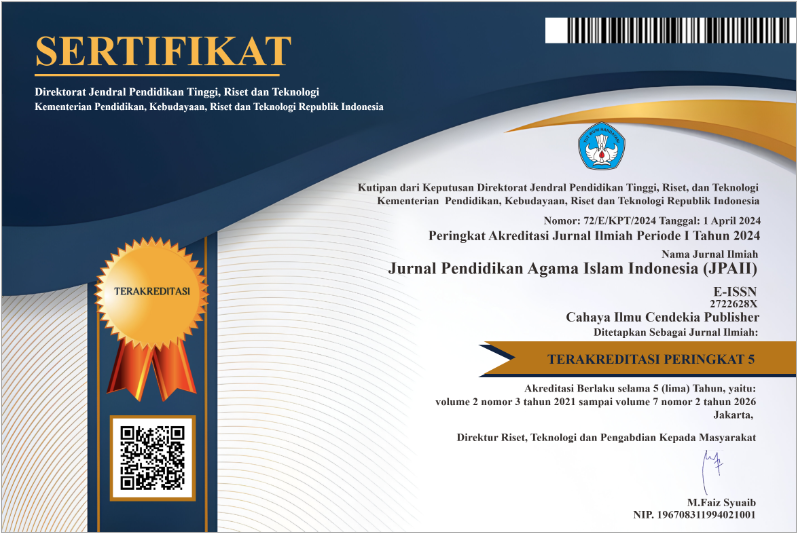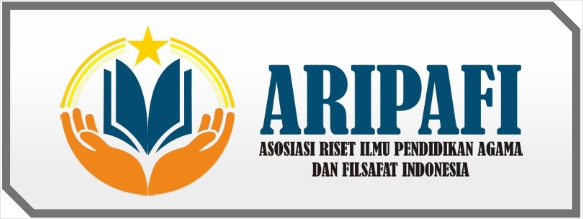Study of Islamic Character Education in the Deli Malay Community, Medan City: Case Study in the Deli Malay Community
Abstract
Purpose of the study: This research aims to determine the forms of Islamic character of the Deli Malay community, the formation of Islamic character education in the Deli Malay community, supporting factors for the formation of Islamic character in the Deli Malay community, and the obstacles faced in forming the Islamic character of the Deli Malay community in the Medan Maimun District environment.
Methodology: This research uses qualitative research with an ethnographic approach. Using observation, interview and document study data collection techniques. In analyzing the data, researchers used qualitative analysis techniques with data reduction steps, data presentation, and drawing conclusions.
Main Findings: Forms of Islamic character such as honesty, responsibility, tolerance and deliberation are strongly reflected in the Deli Malay community in Medan Maimun District. Character formation involves various methods such as teaching, example, habituation, motivation, and enforcing rules. Supporting factors include participation in madrasah or Islamic boarding schools, additional learning in muktabs, and the existence of Malay associations. However, there are also challenges in the process of forming Islamic character, such as the influence of globalization, the lack of Deli Malay culture being maintained, and the lack of figures who can be used as role models.
Novelty/Originality of this study: This research explores various methods and strategies used to integrate Islamic values in character education in this community. It is hoped that the results of this research can make a significant contribution to the development of the Islamic character education curriculum in madrasah and provide guidance for educational policy makers to improve the quality of education.
References
A. Asrori, “Contemporary religious education model on the challenge of indonesian multiculturalism,” J. Indones. Islam, vol. 10, no. 2, pp. 261–283, 2016, doi: 10.15642/JIIS.2016.10.2.261-284.
S. Arifin, “Islamic religious education and radicalism in Indonesia: Strategy of de-radicalization through strengthening the living values education,” Indones. J. Islam Muslim Soc., vol. 6, no. 1, pp. 93–126, 2016, doi: 10.18326/ijims.v6i1.93-126.
H. C. A. Kistoro, E. Latipah, and N. M. Burhan, “Probing Experiential Learning Approach in Islamic Religious Education,” J. Pendidik. Islam, vol. 9, no. 2, pp. 157–168, 2023, doi: 10.15575/jpi.v9i2.24374.
T. Hidayat, A. S. Rizal, A. Abdussalam, and A. G. Fawwaz, “Designing Islamic Values Integration Into Sociology Learning,” J. Pendidik. Islam, vol. 6, no. 1, pp. 37–56, 2020, doi: 10.15575/jpi.v6i1.8119.
Raihani, “A model of Islamic teacher education for social justice in Indonesia a critical pedagogy perspective,” J. Indones. Islam, vol. 14, no. 1, pp. 163–186, 2020, doi: 10.15642/JIIS.2020.14.1.163-186.
I. Mujahid, “Islamic orthodoxy-based character education: creating moderate Muslim in a modern pesantren in Indonesia,” Indones. J. Islam Muslim Soc., vol. 11, no. 2, pp. 185–212, 2021, doi: 10.18326/ijims.v11i2.185-212.
Biyanto, “The typology of Muhammadiyah Sufism: Tracing its figures’ thoughts and exemplary lives,” Indones. J. Islam Muslim Soc., vol. 7, no. 2, pp. 221–249, 2017, doi: 10.18326/ijims.v7i2.221-249.
A. N. Kawakip and Sulanam, “The Practice of Shared Values and Islamic Educational Identity,” J. Indones. Islam, vol. 17, no. 1, pp. 27–53, 2023, doi: 10.15642/JIIS.2023.17.1.27-53.
E. F. Rusydiyah, “Social education through digital literacy among Indonesian female muslim activists the experience of Abdurrahman Wahid’s daughters,” J. Indones. Islam, vol. 14, no. 1, pp. 210–247, 2020, doi: 10.15642/jiis.2020.14.1.210-247.
M. Erihadiana, “The Implementation of Islamic Local Content in Building Character Education at Junior High Shcool Al Amanah Bandung,” J. Pendidik. Islam, vol. 4, no. 2, pp. 41–50, 2019, doi: 10.15575/jpi.v4i2.3812.
A. L. Hakim, “Membangun Karakter Bangsa Melalui Implementasi Pendidikan Karakter Islami Dalam Keluarga,” Ta dib J. Pendidik. Islam, vol. 6, no. 1, pp. 177–188, 2017, doi: 10.29313/tjpi.v6i1.2580.
I. Sutomo, “Modification of character education into akhlaqeducation for the global community life,” Indones. J. Islam Muslim Soc., vol. 4, no. 2, pp. 291–316, 2014, doi: 10.18326/ijims.v4i2.291-316.
C. P. Sari, H. S. Zainiyati, and R. Al Hana, “Building Students’ Character through Prophetic Education at Madrasa,” J. Pendidik. Islam, vol. 6, no. 1, pp. 27–36, 2020, doi: 10.15575/jpi.v6i1.6380.
S. Suciati, “The Impact of Prenatal Education Through Stimulating Quran’S Recitation on Child’S Growth,” QIJIS (Qudus Int. J. Islam. Stud., vol. 3, no. 2, pp. 129–147, 2015.
M. Tahir and N. S. Elbarqi, “State, Secularism, and the Management of Islamic Proselytizing Movement in Türkiye: the Case of Hayrât Vakfi Organization,” Qudus Int. J. Islam. Stud., vol. 11, no. 1, pp. 177–206, 2023, doi: 10.21043/qijis.v11i1.18357.
Masturin, M. R. Ritonga, and S. Amaroh, “Tawhid-Based Green Learning in Islamic Higher Education: an Insan Kamil Character Building,” Qudus Int. J. Islam. Stud., vol. 10, no. 1, pp. 215–252, 2022, doi: 10.21043/qijis.v10i1.14124.
Z. Alwi, Akbar, A. Hady, A. M. Amir, J. Dakir, and L. A. Majid, “the Anomaly of Good-Looking : the Relationship Between Spirituality and Extremism on Hadith and Social Religious Perspective,” Qudus Int. J. Islam. Stud., vol. 9, no. 2, pp. 463–502, 2021, doi: 10.21043/qijis.v9i2.10476.
Syarnubi, F. Mansir, M. E. Purnomo, K. Harto, and A. Hawi, “Implementing Character Education in Madrasah,” J. Pendidik. Islam, vol. 7, no. 1, pp. 77–94, 2021, doi: 10.15575/jpi.v7i1.8449.
Adeng Muchtar Ghazali, “The Concept of Tolerance in Islamic Education,” J. Pendidik. Islam, vol. 1, no. 1, pp. 81–97, 2014.
M. Z. Anwar, Fathan, Warto, and O. N. Hidayati, “Transformation of Economic Theology For Community Empowerment A Case Study on Pesantren-Based Bank Wakaf Mikro,” J. Indones. Islam, vol. 17, no. 1, pp. 76–99, 2023, doi: 10.15642/JIIS.2023.17.1.76-99.
G. Moltafet, M. Mazidi, and S. Sadati, “Personality traits, religious orientation and happiness,” Procedia - Soc. Behav. Sci., vol. 9, pp. 63–69, 2010, doi: 10.1016/j.sbspro.2010.12.116.
A. Kasdi, “Reconstruction of fiqh Nusantara: Developing the Ijtihad methodology in formulating fiqh from Indonesian perspective,” Qudus Int. J. Islam. Stud., vol. 7, no. 2, pp. 239–266, 2019, doi: 10.21043/qijis.v7i2.4797.
I. Sutomo and Budihardjo, “The rejection of religious nationalism towards the secular state and the Islamic caliphate: Indonesian religious figures perspective,” Indones. J. Islam Muslim Soc., vol. 11, no. 1, pp. 115–137, 2021, doi: 10.18326/IJIMS.V11I1.115-137.
M. A. Abdullah, “Islam as a cultural capital in Indonesia and the Malay world: A convergence of Islamic studies, social sciences and humanities,” J. Indones. Islam, vol. 11, no. 2, pp. 307–328, 2017, doi: 10.15642/JIIS.2017.11.2.307-328.
M. Yaseen Gada, “On pluralism, religious ‘other’, and the Quran: a post September-11 discourse,” Indones. J. Islam Muslim Soc., vol. 6, no. 2, pp. 241–271, 2016, doi: 10.18326/ijims.v6i2.241-271.
D. E. Hulawa, “Al-Zarnuji’s Character Concept in Strengthening Character Education in Indonesia,” J. Pendidik. Islam, vol. 4, no. 2, pp. 25–40, 2019, doi: 10.15575/jpi.v4i2.2395.
A. Ushuluddin, A. Madjid, S. Masruri, and M. Affan, “Shifting paradigm: From Intellectual Quotient, Emotional Quotient, and Spiritual Quotient toward Ruhani Quotient in ruhiology perspectives,” Indones. J. Islam Muslim Soc., vol. 11, no. 1, pp. 139–162, 2021, doi: 10.18326/IJIMS.V11I1.139-162.
J. Kormos and K. Csizér, “The Interaction of Motivation, Self-Regulatory Strategies, and Autonomous Learning Behavior in Different Learner Groups,” TESOL Q., vol. 48, no. 2, pp. 275–299, 2014, doi: 10.1002/tesq.129.
S. Lisnawati, “The Habituation of Behavior as Students’ Character Reinforcement in Global Era,” J. Pendidik. Islam, vol. 2, no. 3, p. 413, 2016, doi: 10.15575/jpi.v2i3.852.
N. Nurdin, “To research online or not to research online: Using internet-based research in Islamic Studies context,” Indones. J. Islam Muslim Soc., vol. 7, no. 1, pp. 31–54, 2017, doi: 10.18326/ijims.v7i1.31-54.
Marwazi and M. Husnul Abid, “Traditional Madrasah, State Policies and the Rise of Integrated Islamic Schools in Jambi,” J. Indones. Islam, vol. 15, no. 1, pp. 75–102, 2021, doi: 10.15642/JIIS.2021.15.1.75-102.
Agung, “Konsep Pendidikan Karakter Islami : Epistemologis,” Al-Tarbawi Al-Haditsah J. Pendidik. Islam, vol. 3, no. 2, pp. 52–70, 2018, doi: 10.24235/tarbawi.v3i2.3315.
A. Mas’ud, A. Z. Fuad, and A. Zaini, “Evolution and orientation of Islamic education in Indonesia and Malaysia,” J. Indones. Islam, vol. 13, no. 1, pp. 1–20, 2019, doi: 10.15642/JIIS.2019.13.1.21-49.
Copyright (c) 2024 Muhammad Ilham Syahputra, Sulayman Adeniran Shittu, Ayesha Qurrat Ul Ain

This work is licensed under a Creative Commons Attribution 4.0 International License.
Authors who publish with this journal agree to the following terms:
- Authors retain copyright and acknowledge that the Jurnal Pendidikan Agama Islam Indonesia (JPAII) is the first publisher licensed under a Creative Commons Attribution 4.0 International License.
- Authors are able to enter into separate, additional contractual arrangements for the non-exclusive distribution of the journal's published version of the work (e.g., post it to an institutional repository or publish it in a book), with an acknowledgment of its initial publication in this journal.
- Authors are permitted and encouraged to post their work online (e.g., in institutional repositories or on their website) prior to and during the submission process, as it can lead to productive exchanges and earlier and greater citation of published work.







.png)
.png)





















